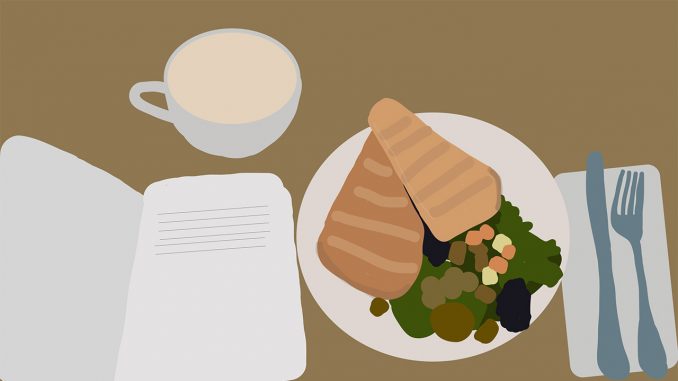
Admittedly, I overplan.
Being a full-time student with a full-time job requires strict scheduling weeks ahead of time, and my days are often defined by stringent itineraries and worries about getting everything done on time.
As a result, I’ve found my poetry to be reflective of my anxious mental state: incredibly formulaic and structured. Last semester, for example, I wrote a longform poem in which every single word was carefully chosen to match a pattern I created for myself.
I loved the poem, but I couldn’t help feeling like I was restricting myself by excessively planning each word.
This is a concern I’ve often had with my writing. I think far too much about the minute details, like whether I should include or change an individual word or phrase. Even while writing this essay, I’m obsessing over the smallest details, setting up each line so it adequately explains my narrative.
This past Sunday was the first day with drastic change.
I spent the morning getting brunch with a new friend, plans I made nearly one week ahead of time. She’s a writer too, so we spoke about our different artistic processes over vegan pancakes. She told me sometimes her best poetry comes when she writes in a stream of consciousness, transcribing her thoughts as they come to her.
For her, spontaneity is more truthful than when she carefully plans what she wants to write. It’s a method I hadn’t thought much of, but as we went our separate ways, I thought about it more.
I walked in the direction of my train station, prepared to take the 20-minute ride home to get started on the seemingly insurmountable tower of homework that awaited me.
And then, with only a block between me and my train, I turned in a random direction. Encouraged by her embrace of spontaneity, I decided to be impromptu in my own way. I purposefully got lost in Philadelphia.
I walked on streets I never knew existed and took note of murals, architecture and cultures of the areas I was adventuring through. At some points, I stopped to take photos of things that intrigued me. And I had this uncontrollable urge to start writing.
As soon as I spotted a Target, I bought a notebook and pen. Next thing I knew, I was in Rittenhouse Square. The 40-degree weather didn’t stop me from sitting down and writing what I saw around me through my own perception.
Unlike most of my other poems, I didn’t structure my writing into stanzas. I simply wrote paragraphs about the world around me — my thoughts on everything from the way the sky looked to the way the people around me danced to a jazz band playing in the center of the park.
After I felt like I had written enough, I got up and once again started walking in a random direction. I strolled through West Philadelphia, typing short poems into my phone:
“heavenly bodies waltz to nondescript jazz pieces, children with the crown of halos climb copper castles, and sunlight dashes along the brass frame of a portrait of mid-twentieth century beauty. jean jacket, ripped jeans, and a camouflage du-rag: a heart of gold, if i ever knew him.”
Everything I did that day, from turning down streets and stopping wherever I could to jot down words I felt inspired to write, was entirely spontaneous. As someone who rarely experiments with spontaneity, I felt truly exhilarated.
I eventually returned to my starting point, South Street, and ventured into a random coffee shop to escape the steadily declining temperature outside. There, I wrote down some final words, releasing some thoughts on a past friendship that had been on my mind over the past few days.
Emotionally and physically drained, I read all of the words I had written during that afternoon and was astounded. By breaking free of the constraints of structure and my own expectations, I wrote some genuinely great poems about subjects I rarely observed during a typical writing session.
By writing whatever came to my head, I could perfectly express my innermost thoughts and ideas in ways I hadn’t before. My writing became abstract and introspective.
When I returned home, my feeling of spontaneity was still so strong I dyed my hair purple. The next day, as I walked back from class, the same feeling approached me, and I stopped immediately to write another poem, this time about what purple hair meant for me.
Spontaneity allows every poem I write to be uniquely exciting, and in a matter of one week, my writing style has changed dramatically for the better.
Planning and overplanning are rational and important, but purposefully getting lost in Philadelphia is far more fun.



What an amazing article. Now I’m inspired 😀